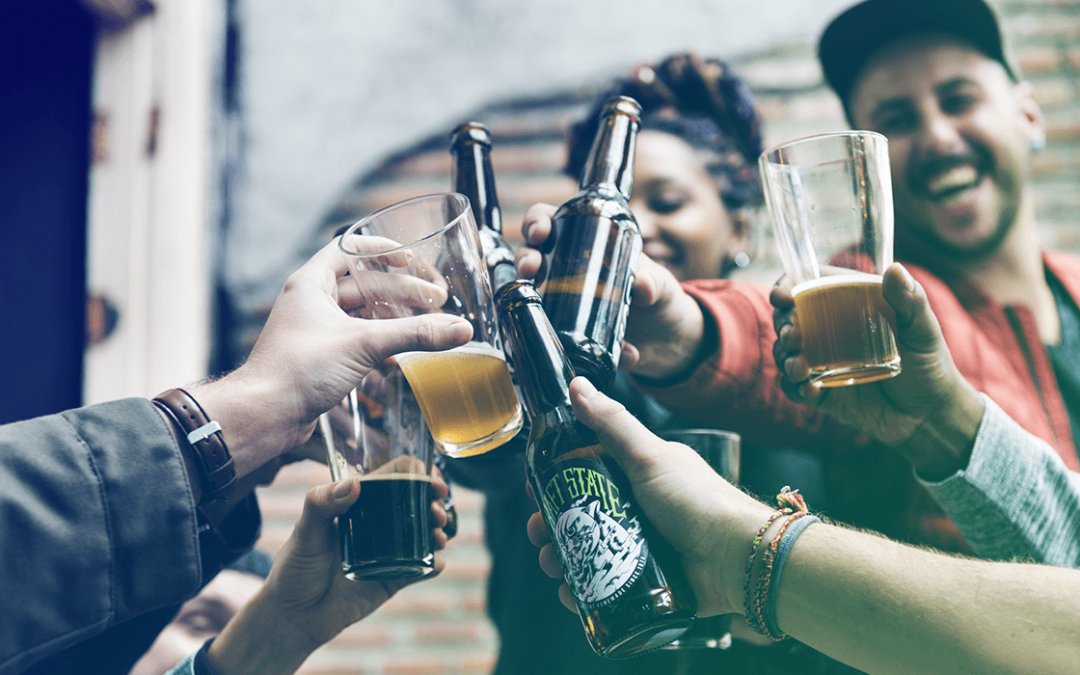You might have decided to embark upon a low sugar diet. Or a low carb one. Or just a low calorie one. Or just looking after your health. Whatever your goal and whatever way you’re looking to achieve it, some things make sticking to it a little more complicated. Like the weekend. Or eating out. Or perhaps more regularly, alcohol.
Alcoholic drinks are a minefield when it comes to their nutrition. There are so many different types and brands, each with its own nutritional label, which isn’t always easy to find.
For people on a diet, this can pose a problem. Because there are only 55 calories in a vodka shot, but a Pina Colada cocktail can top the charts with up to 450 calories. That’s a pretty big difference. And whilst it’s more than okay to indulge a little, it might not be the best idea to make it your regular alcoholic drink of choice.
Whether you’re on a diet, looking to cut down on carbs or sugar, or just in search of a low-calorie or sugar-free alcohol to become your new go-to at the pub, there is good news. You have options. You can still enjoy a tipple without going overboard on sugar. There are plenty of choices out there for those who drink alcohol. As with anything, moderation is key. But here’s a list of low sugar options if you’re in the mood for a Friday night drink. Or a Tuesday night. No judgement here.
Are you an employer? Hussle now offer flexible, discounted access to our fitness venues as an employee benefit. Elevate employee wellbeing.
How much sugar should I have per day?
The recommended daily sugar intake from the NHS is 50 grams for women and 70 grams for men. Spend your allowance wisely.
Don’t forget that there’s more than one type of sugar. Whether it’s natural or refined plays a significant role in if it’s deemed healthy or not. Try not to demonise sugar as it’s found in many food sources that should make up a large part of our diet, including fruit and vegetables. Cutting out an entire macro-nutrient probably isn’t a good idea.
Sugar-free vs carb-free?
Lots of people talk about cutting out either sugar or carbs in the name of health. But there’s a couple of things to consider here. Firstly, carbohydrates contain sugar. When we eat them, they are converted into glucose (sugar), and we use that as energy for our muscles. So, if you’re going low on carbohydrates, then you’re going low on sugar too.
Secondly, food can be categorised into three macro-nutrient groups: protein, carbs and fat. We need all of these to function correctly. Each provides us with the essential nutrients we need to function. And while reducing our carb intake might be a good idea for some people, it’s important not to overdo it or demonise carbs. We need them for energy. All fruits and vegetables are classified as carbs.
Which alcohols don’t contain sugar?
Lots of hard alcohols don’t contain carbs. Think spirits with high alcohol volume. These all have no carb content and can be seen as sugar-free. Due to the small volume you drink, they’re also pretty low on calorie content. Perfect for those on the hunt for sugar-free alcohol. Examples include:
- Tequila
- Gin
- Brandy
- Whiskey
- Rum
Drinking spirits like these are a good way to keep your sugar intake to a minimum. But, they’re not the most casual drinks to be enjoyed on their own. Thursday night laid back beverages. Yes, please. Shot of straight tequila. No thanks.
So when it comes to spirits, it’s really the mixers you need to be looking out for. Fruit juices and fizzy drinks such as coke are a popular addition but are likely to add sugar to your alcohol drink without you even noticing.
Your best bet is to top your hard spirits with soda water, add a squeeze of fresh lemon or lime, or use light tonic water to help you keep those sugar levels at their lowest.
What about wine and beer?
They’re a popular pub or bar choice, so you might be worried about the nutrition in your favourite beers or wines. Although you can’t expect zero sugar in these alcoholic drinks, it’s not all bad news.
There are lots of different wines you might need to watch out for. It’s almost impossible to break down the nutritional value of each and every bottle. But some general guidelines can help you to understand what the best option is. Let’s unpick it.
Red wine Thanks to the beneficial chemical compounds it contains (polyphenol and resveratrol), red wine is one of the best choices for those ditching sugar. One serving, or a large (250ml) glass, of red wine contains just under 1 gram of sugar. That’s about 1/4 of a teaspoon. Of all wines, red has the lowest sugar content.
White wine White wine is where it gets a bit trickier. Dry white wine contains a lot less sugar than sweet white wine. For a 250ml glass, you’re looking at around 1.5 grams for the dry type and 14.5 grams for the sweet kind. For a medium white? You guessed it: somewhere in the middle.
Fizz A 100ml glass of bubbly contains just 80 calories and a gram of sugar, well under a teaspoon. We raise our glasses to that news.
Beer Beer also has a spectrum of sugar content. And whilst it can be high in calories and carbohydrates, it tends to be relatively low in sugar content. That’s because of the type of sugar molecules it contains. If you want the science talk, it contains oligosaccharides, which your body just can’t digest. Regular beers can contain 13 grams of carbs but zero grams of sugar. Interestingly, lots of non-alcoholic beers have way more sugar—up to 29 grams.
So what’s the takeaway?
If you’re looking to go low sugar, then there are some basic approaches you can take. Your best bet is to stick with hard spirits like gin, vodka, whiskey and rum, but watch your mixer. Wine is a good option, but it’s best to go for a red or a dry white. Beer might be good for low sugar, but it can be high in calories.
So pick your tipple and enjoy it in moderation, of course.



